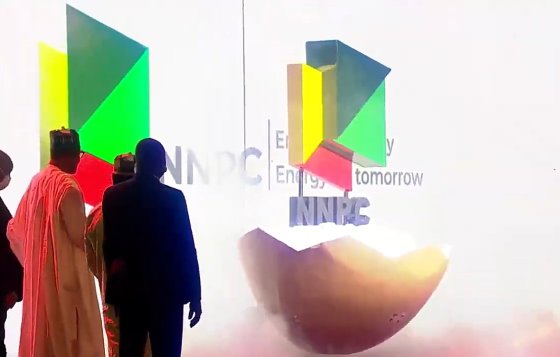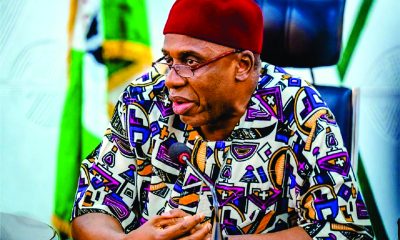Business
NNPC Grows Profit To N674bn, Assets Hit N16.3trn

The Group Chief Executive
Officer, Nigerian National Petroleum Company (NNPC) Limited, Mele Kyari, has announced that the NNPC as a corporation grew its profit after tax and assets from N287 billion and N15.86 trillion in 2020, to N674 billion and N16.3 trillion in 2021, respectively.
Kyari, who disclosed this at a press conference in Abuja, said the 2021 profit was contained in the Group Audited Financial Statement of the oil firm for the year ended December 31, 2021.
He also disclosed that all major trunk lines conveying crude oil to export terminals were currently shut down in order to avert further oil theft in the Niger Delta.
He, however, stated that efforts by the oil firm, security agencies and surveillance contractors were paying off, as about 400,000 barrels of crude would be added to the country’s output in the next few days.
The NNPC boss said, “In September 2021, Mr. President graciously approved the publication of the 2020 NNPC Group Audited Financial Statement, in which NNPC declared a profit after tax of N287bn for the first time in its 44 years.
“Despite our challenging operating environment, we strongly believe that NNPC has the potential to sustainably deliver better value to its esteemed shareholders.
“Today I am happy to announce that the Board of NNPC Limited has approved 2021 audited financial statements, and NNPC progressed to a new performance level, from N287 billion profit in 2020 to a N674 billion profit after tax in 2021, climbing higher by 134.8 per cent year-on-year profit growth.”
He continued ed, that “the group’s financial position recorded an increase in total assets from N15.86 trillion in 2020 to N16.27 million in 2021, while our total liabilities decreased by 8.3 per cent from N14.68 trillion in 2020 to N13.46 trillion in 2021.
“Our shareholders fund position grew to N2.81 trillion, representing 144 per cent year-on-year. The performance would have been greater if the operations in the year under review were free from incessant vandalism, crude oil and products’ theft among others.”
In the main drivers of the profit, Kyari said, “Our core business is upstream, gas and power. So the key drivers to this performance are coming from the upstream and the gas and power.”
Commenting on the amount of crude oil being lost to theft and why it had been difficult to contain oil theft, the NNPC helmsman stated that though oil production had slumped, not all reported volumes were stolen.
“Today, our production is around 1.2 million barrels per day. We have proven capacity and this was seen in 2020, where our production, without any intervention, peaked at 2.49 million barrels per day.
“That means we have capacity, without doing anything extra, to produce up to 2.49mbpd. But since COVID-19 abated and, of course, the issues around the acts of vandals returned, we saw this gradual decline in our production to the point of this 1.2mbpd production currently.
“That means that you can easily produce up to 2.49mbpd but you couldn’t do it because of the acts of vandals. Now, this doesn’t mean that the difference between 2.49mbpd and 1.2mbpd is stolen. No. It is far from this.
“As we speak now, all our major trunk lines are shut down. That means you are not flowing crude oil into these lines, but you could have done it and it doesn’t mean the product is stolen. When the lines are running, you can lose a substantial part of that volume.
“And we believe that when they are running, you can lose up to 200,000 barrels to theft. But in actual losses today, our budget level plan is to produce at 1.8mbpd. So, if you are doing 1.2mbpd, it technically means you are losing the difference between 1.2mbpd and 1.8mbpd.
“And this is around 600,000bpd as opportunity lost, not stolen. So, once you bring back the line and you are not able to secure it, you’ll still get some of the oil flowing into the terminals but you’ll lose some part of it”, he said.
Kyari insisted that the above scenario did not mean that 600,000bpd of oil was stolen, describing it as opportunity lost because of the shutdown of production facilities.
“But I’m happy to also say that the interventions that we have seen in terms of the security measures we have taken, in collaboration with the government security agencies, with the private surveillance and security contractors, and the investments that we have done, we believe that in the next couple of days we will be able to bring back the Trans Niger Pipeline,” he said.
###
Business
Tinubu’s RHI Doles Out N50m To 1,000 Kwara Petty Traders

Business
UBA To Educate SMEs, Business Owners On Withholding Tax

Business
Nigeria Losing $40b Annually From Maritime Sector – NIMENA
-

 Politics5 days ago
Politics5 days agoPDP Governors’ Forum Pays Condolence Visit To Makinde …Over Demise Of Elder Brother
-

 Politics5 days ago
Politics5 days agoHow I Would’ve Handled Subsidy Removal As President – Amaechi
-
Nation5 days ago
NGO Honours Individuals, Groups For Outstanding Contributions To Humanity
-
Politics5 days ago
Stop Lying About Your Wealth, Odinkalu Knocks Buhari
-
Business5 days ago
CBN Releases FX Code To Mitigate Financial Risks
-

 Editorial5 days ago
Editorial5 days agoNo To Hike In Telecom Tariffs
-

 Featured5 days ago
Featured5 days agoFG Suspends Max Air Operations For Three Months Over Kano Incident
-
Nation5 days ago
Rivers CP Eulogises LG Boss Over Donation Of Vehicles

